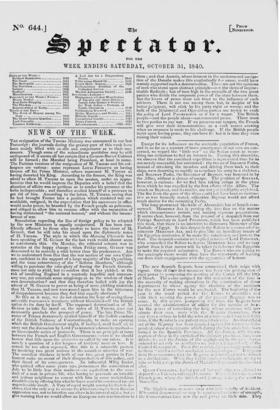NEWS OF THE WEEK.
Tun resignation of the THIERS Ministry was announced in our last Postscript : the journals during the greater part of this week have been mainly filled with on dits and conjectures as to their suc- cessors. Though some of the subordinate portfolios may be still undisposed of, it seems all but certain that a GuizoT-SonsT Cabinet will be formed ; the Marshal being President, at least in name. The Parisian versions of the resignation of M. THIERS and his col- leagues are various: some represent Louis Piiimern as having thrown off his Prime Minister, others represent M. 'NIERS as having deserted his King. According to the former, the King was afraid to allow M. THIERS to open the session, under an appre- hension that he would impress the Deputies with a belief' that the situation of affairs was so perilous as to render his presence at the helm indispensable and therefore availed himself of a pretence to get rid of him. According to the latter, M. Timms, seeing that he had brought France into a position which rendered war un- avoidable, resigned, in the expectation that his successors in office would make peace, be branded by the French people as poltroons, and obliged to allow him to resume office with the reputation of having maintained " the national honouri" and without the incum- brance of war.
Speculation regarding the line of foreign policy to be adopted by the new Ministers is equally conjectural. It has been con- fidently affirmed by those who profess to know the views of M. GUIZOT, that he will take his stand upon the diplomatic notes .of M. TH1ERS. The style in which the Morning Chronicle has been speaking of' M. GU1ZOT for the last week would almost seem to corroborate this. On Monday, the editorial column was in ecstacies at the happy change : when Friday came, GUIZOT was discovered to be scarcely a whit better than his predecessor. Are we to understand from this that the war section of our own Cabi- net, confident in the support of a large majority of the Opposition, and the tame subserviency of the " Reform Members," although willing to purchase the vain-glory of forcing the French Govern- ment not only to yield, but to confess that it has yielded, at the tisk of involving England in a wantonly impolitic and unneces- sary war, yet entertain sonic misgivings as to the wisdom of their own determination ? and that they therefore hailed with joy the advent of M. GUIZOT to power as being of more yielding materials than M. TIMES, and now two cound upon him in the bitterness of disappointment because they find him equally obstinate ? Be this as it may, we do not abandon the hope of seeing these miserable tracasscrics terminate without bloodshed—if the British nation do its duty by itself. The supposed determination of l. GUIZOT to take his stand on the notes of M. Tninas, does not necessarily preclude the prospect of peace. The late Prime Mi- nister of France dexterously availed himself of the tbolish conduct of the British Embassy at Constantinople, to make an opening which the British Government might, if inclined, avail itself of, to carry out the discussion by Lord PALMERSTON'S favourite method— an interminable series of protocols. There is no prineiple at issue between the French and English Governments—even it' we should bestow that title upon the niqiserks so called by our rulers. It is -merely a question of a few leagues of territory more or less. It cannot be too often repeated, that this is a miserable pretext for involving two great nations in the countless misNies of war. The soundest thinkers in both of' our two gr.stlt parties in Par- liament make no secret of their disapprobation of this policy, and
their dread of its consequences. An influential Whig leader, who quitted office some years ago, pronounces the convention of July to be little less than madness—as equivalent to the con-
duct of a man in private life, Who having, to persuade an irritable and jealous neighbour to concur with him ill some undertaking, should begin by offering him what he knew would be con ,t rued into an
unpantonable insult. A Tory of equal weight among his frich;ls dares, that time only way to secure the.Ottoman empire from Rus,ian The autumn wears away with 1:1:!•• ::.-volty of incident_
aggression was, not to hit erfere ourselves 111 its 1111(41131 ;111‘31N, 11111 to If boat:11111 dcloon:trati.,ll,:. may be con...i,j, !•:, ideneks of strength, give warning that we would allow no European nation to interfere in the Conservatives have now time real their side. They them ; and that Austria, whose interest in the unobstructed naviga- tion of the Danube makes this emphatically her cause, would have warmly supported such a determination. These are not the opinions of men who stand upon abstract principle—not the views of imprac- ticable Radicals ; but of men high in the councils of the two great parties who divide the corporate power of the state between them. But the lovers of peace must not •trust to the influence of such advisers. There is not one among them but, in despite of his better judgment, will stick by his party right or wrong; and the bulk of the Ministerial and Opposition parties are trying to exalt the policy of Lord PALMERSTON as if for a wager. The British people—and the people alone—can command peace. There must be two parties to any war. If we preserve our temper, the French will give over their demonstrations, as a cock ceases crowing when no response is made to his challenge. If the British people insist upon having peace, they can have it : but it is time they were raising their voices.


























